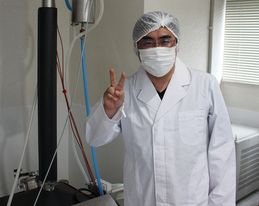Interview Neo Blue Distillery from Japan!
An interview with Kazuhiko Nishimura. Owner and master distiller of Japan's Neo Blue Distillery ...
1. How did you get involved in the alcohol industry?
After graduating from a university majoring in Japanese logistics, I joined one of the largest alcohol logistics companies in Japan(NIHONSHURUIHANBAI CO., LTD.).
2. What made you decide to pursue distilling?
I have been working with French wines for 20 years. However, vinification is very difficult, and wine design is limited. As a result, we chose a GIN that can be made without manufacturing experience.
3. Can you tell us more about your distillery?
I run it by myself in a very small rural town in Japan. The capital investment was 200,000 yen. Most processes are manual. All processes are electric and manual for zero CO2 emissions. However, this is due to the fact that we could not invest in gas equipment, as was the original goal, due to lack of funds.
In Japan, the distribution volume of herbs is small, and there are few farmers, so it is difficult to obtain pesticide-free herbs. I rent and grow herbs on abandoned farmland around the distillery. In addition, I came up with a unique method, and this practices pesticide-free herbs cultivation based on a specific farming method, and has a large harvest with less labor.
Also, using alcohol, including methanol, will make the gin's aroma less pure, which will have a negative effect on the human body. I noticed this theory, and I ask the supplier to make ethanol with a purity of 99.9% and use it as the base alcohol.
In addition, I use many herbs, including rose, as raw materials, so that the GIN I make has medicinal properties other than getting drunk. Of course, we use roses, so we don't use ingredients that contain a lot of potassium.
4. How did you find iStill? And what made you decide to choose our stills?
I had only about 15 million yen in funds, and many copper distiller manufacturers pointed out lack of funds and could not sell me their still. As a result, I searched on the Internet and found that there was a distiller that I could purchase for less than 5 million yen, that I could distill without using gas, and that I could do some work in my limited time. It was iStill.
The educational curriculum was helpful. By making GIN in Holland with the iStill University courses, I was even able to earn a sake brewing license in Japan.
5. What are your plans for the future?
I am currently planning to be involved in the production of three GINs. First, I realized that my distillery does not have the functions to exceed the production volume set by the Japanese government, so I am considering relocating with investment. Using a 500L iStill to create a distillery including retail, tourism and service industries.
The second is to set up a distillery in a local city in Japan that uses a train station. This also uses a 500L iStill. In this case, we mainly focus on the tourism industry, but I think it will be a highly fashionable distillery using local specialties such as gems and roses.
Third, in order to sell my GIN overseas, I would like to outsource the production to a distillery that uses the same iStill, and create a logistics system that does not generate shipping costs from Japan and commissions to trading companies. Also, is it possible to grow herbs overseas with my new agricultural theory?
We are also looking into whether it is possible to hold an iStill school in Japan. Much of Asia sticks to distillation techniques above the boiling point of water. Consumers are obsessed with sake that will be born in the future, so I would like to have more opportunities to convey to Asian countries that there are other theories and technologies.
6. What would be your advise to starting new distilleries?
It's extremely simple, but I think it's important to be conscious that GIN is not a liquor, but a drink born out of chemical theory. Rather than sticking to botanical grams, I think it's about knowing the nature of water and alcohol contained in the ingredients and the extraction method of the ingredients. Alcohol is the only liquid with a lower boiling point than water.
If there is a need for many people who make GIN, I would like to work together to create recipes and create fragrances and flavors using agricultural products from each country. However, I can't understand many languages including English, so please prepare transportation, accommodation, and meals for two members of the Neo Blue team.
Finally, I had no money, no skills, we won the GIN Masters Ultra premium, under the WABISABI brand name, started by my American partners. So two years after starting to make GIN, we were able to create a product that surpassed KINOBI Pernod Ricard's KINOBI GIN, which is well represented and received in Asia.
I am grateful to everyone at iStill for accepting me in 2019, when I came from Japan and didn't know much about GIN. Thank you!
WABISABI GIN elected one of 10 best gins ...
Kazuhiko-san ...

Reactions
Add your comment
All reactions ()
Loading comments..